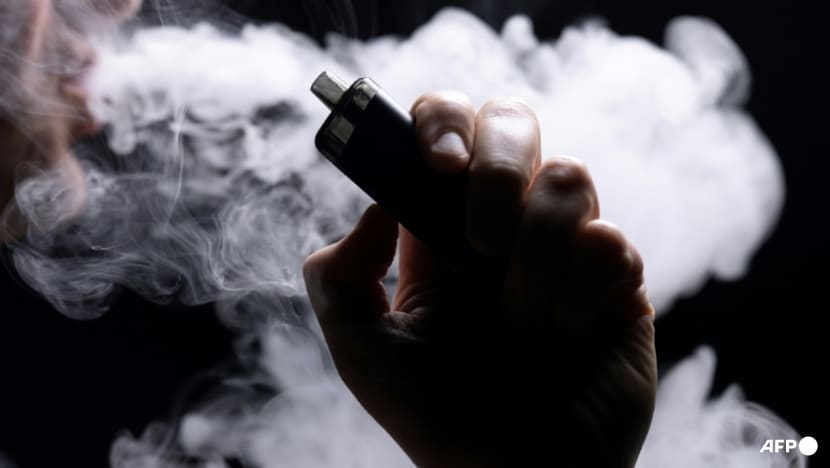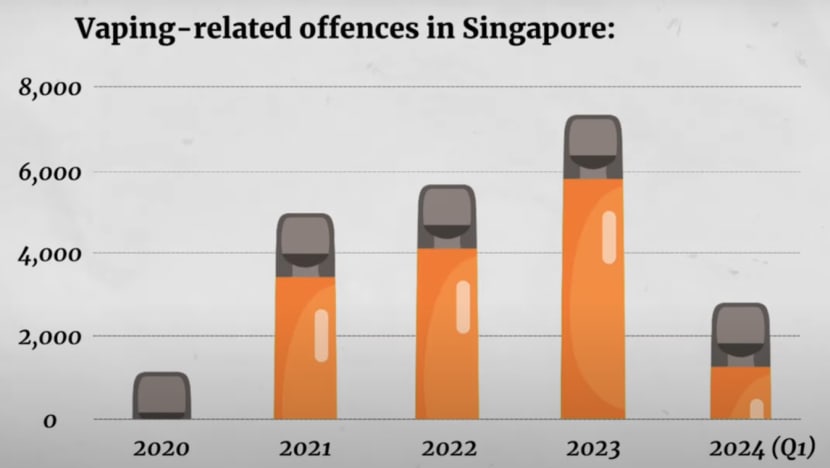CNA Explains: Is vaping ‘getting out of hand’ in Singapore, and what can be done?
One expert suggests annually testing all students of a particular cohort, as a way to discourage vaping.


This audio is generated by an AI tool.
SINGAPORE: Vaping is illegal in Singapore. But that’s not stopping some people from picking it up and doing it regularly – including as early as in primary school.
In December 2023, CNA reported on a grassroots campaign in the MacPherson neighbourhood calling for youths to surrender their vapes in exchange for a shopping voucher.
The youngest to do so was 12 years old.
On Thursday (Aug 1), Singapore's health authorities said nearly 700 students were referred to them and fined for using or possessing vapes, in the second quarter of 2024.
During that same period, more than 2,500 people were also nabbed for possessing or using vapes, a 30 per cent increase from the previous quarter.
It was described as "an intensified multi-agency effort to protect our population from the harmful effects" of vapes.
Why is vaping so hard to stamp out?
Vaping was first banned in Singapore in 2018. Despite the threat of fines or jail time, the number of people caught possessing or using vapes jumped by 60 per cent between 2022 and 2023.
Health authorities have also noted that from 2019 to 2023, a quarter of those caught below the age of 18 were repeat offenders.

The “very worrying” data points to a clear uptick in the number of people engaging in vape-related activities, said Professor Teo Yik-Ying, dean of the Saw Swee Hock School of Public Health at the National University of Singapore.
It also suggests, globally, that vaping is a much bigger problem than regular tobacco cigarettes ever were, he added.
Vapes are currently banned in 34 countries. In Southeast Asia, besides Singapore, it's illegal in Laos, Brunei, Cambodia and Thailand.
Thailand first banned vapes in 2014, but still saw a spike in use among children from 3.35 per cent in 2015 to 17.6 per cent in 2022.
“The World Health Organization had to launch a global call to action last December to clamp down on youth and adolescents vaping,” Prof Teo noted. “Precisely because this is a problem that is getting out of hand.”
The WHO had called for “urgent measures” such as banning all flavours, outlawing attractive packaging and for countries already banning vapes to double down on enforcement.
Assistant Professor Yvette van der Eijk, also from the Saw Swee Hock school, pointed to “international pressure” as a factor.
“Even though vaping is banned in Singapore, it's legal in a lot of other countries and especially our neighboring countries … Malaysia and Indonesia, they both have quite large and quite thriving markets,” she said.
“With that, inevitably there's going to be more of a flow of vapes into the nearby countries.”
The vape industry in Malaysia previously operated in a grey area as the act was unregulated but the selling of nicotine liquid and gels - key components in vapes - was illegal.
But in a shock move in April last year, Malaysia’s government exempted nicotine liquids and gels as controlled substances. They are now taxable items which can be sold on the open market.
Just how harmful is vaping?
Inside the average vaping device and its cartridge is a liquid which can contain nicotine, along with all sorts of flavours like candy, fruits and even peanut butter.
Vapes can also contain compounds and elements like carbonyls, formaldehyde, benzene, tin, lead and nickel.

These are substances with the potential to damage the lungs, heart and immune system – and even maybe cause cancer, said Dr Puah Ser Hon, who heads the respiratory and critical care medicine department at Tan Tock Seng Hospital.
One main effect he’s observed is scarring and inflammation within the lungs.
“Some even end up in the ICU or the intensive care unit, requiring all sorts of invasive materials just to keep the person alive,” he added.
Countries like New Zealand and the United Kingdom, however, regulate vaping and have said it helps people quit smoking.
But this approach could create another problem.
Dr Puah pointed to a study which found that vaping was initially better than nicotine replacement therapy, in getting cigarette smokers to stop.
“However, then you will find that this group of people who were previously addicted to cigarettes; now moving on to an addiction to vapes.”
What can be done to discourage vaping?
Raising awareness is key – and when it comes to the younger generation, it’s about discerning the credibility of information, said Asst Prof van der Eijk.
“The problem with the vaping issue is that the vaping industry has been funding a lot of scientific research, which is honestly junk.”
She pointed to a 2019 review of over 800 scientific papers on vaping, which found that about a quarter were funded by the tobacco industry. And these articles were 60 times more likely to conclude that vaping is a good thing.
Youths need to be taught about such conflicts of interest as well as how the industry uses social media to manipulate them, Asst Prof van der Eijk added.
Singapore’s schools carry out monitoring and enforcement on top of education to convey the harmful effects of vaping.
CNA understands test kits are used by health and education authorities in enforcement operations, though it’s also up to individual schools to deploy these.
But Singapore could explore doing regular testing, said Prof Teo, suggesting a check on all students of one cohort, on one day a year.
In the United States, public schools are required to remove any student caught with a vape from regular classes, and to temporarily put them on a disciplinary alternative education programme.
The same year this went into effect - 2023 - a national survey reported a drop in vape use among high school students, from 14.1 per cent to 10 per cent.
“We cannot tackle vaping with traditional approaches that we use for tobacco control. We have to innovate,” said Prof Teo.
“We have to be smarter at finding who these people are that are vaping … and making sure that the penalty for anyone that is bringing in vapes is a lot higher.”
Is the existing punishment harsh enough?
Anyone caught with a vape in Singapore could be fined up to S$2,000 (US$1,496).
If you're caught selling, importing or doing anything related to making it available – it’s a fine of up to S$10,000 or six months in jail, or both. This could double if you're caught multiple times.
People who continue to vape are clearly either unaware or “disdainful” of the penalties, said Prof Teo.
On a single day on Jul 29, the Health Sciences Authority (HSA) caught - and fined on the spot - 57 individuals vaping in central areas in Singapore.
Prof Teo added that for those smuggling vapes through border checkpoints, the perceived benefits clearly outweigh the risks: A potential profit in the millions of dollars versus a potential imprisonment of one year is a “no-brainer”.
Prof Teo suggested that suppliers be punished proportionately to the size of the haul they are caught with.
In December last year, Singapore’s health authorities said they would step up enforcement at border checkpoints like Changi Airport.
A series of local raids in June also led to the disruption of what was called "one of the largest" vape distribution networks in Singapore, with the seizure of hundreds of thousands of vapes worth S$6 million and meant for sale on messaging app Telegram.
In the second quarter of 2024, HSA also worked with administrators of local e-commerce and social media platforms to take down more than 2,000 listings of vapes and components.
Singapore authorities are also reviewing the penalties, which remain lower than in other jurisdictions.
In Brunei, where vapes are categorised as imitation tobacco products, a person found selling or importing vapes can be fined B$5,000 (US$3,742).
And over in Australia, where the sale of vapes is banned outside of pharmacies, individuals found selling non-therapeutic vapes can face seven years in jail or a AU$2.2 million (US$1.43 million) fine.
Earlier this year, Singapore's Senior Parliamentary Secretary for Health Rahayu Mahzam said HSA was working on strengthening deterrence against the advertising, importation and distribution of vapes.
The agency is trying to step up efforts in monitoring and removing vape content online, she said.
Additional reporting by Sally Lee




















